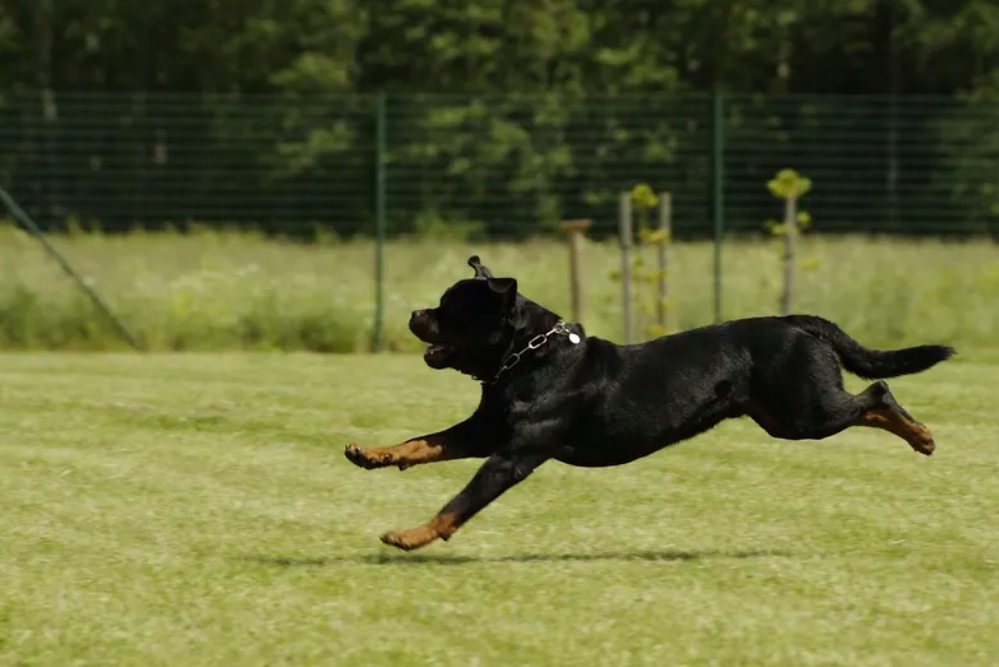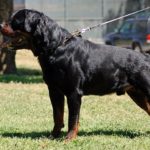It is your responsibility as a pet owner to ensure that your Rottweiler is happy, active, and healthy throughout its life. This involves proper care, regular veterinarian visits, a balanced diet, regular exercise, and proper training and socialization. Furthermore, Rottweilers are prone to certain health issues such as hip and elbow dysplasia, bloat, obesity, some forms of cancer, dental difficulties, and behavioral issues such as separation anxiety. You can help ensure that your Rottweiler has a long and healthy life by recognizing these health concerns and applying key recommendations for keeping your Rottweiler healthy. Some of these important tips include giving balanced food, frequent exercise and training, regular dental check-ups, good grooming, and regular veterinary check-ups.
Rottweiler Exercise and Physical Activity Recommendations
As a general rule, Rottweilers should obtain at least 30 minutes to an hour of moderate to intense exercise every day. Brisk walking, jogging, running, hiking, and swimming are examples of such activities. Rottweilers also like mentally stimulating activities such as obedience training, agility training, and interactive games. It’s also important to provide them with lots of opportunities for fun, both indoors and outside. This includes games like fetch, tug of war, and hide and seek. Rottweilers are also known to appreciate exercises that involve both mental and physical exertion, such as herding and weight pulling. You should begin slowly and gradually increase the intensity and length of their activity as they become older and more physically fit. It’s also important to monitor your Rottweiler’s energy levels and alter their activity appropriately. Before beginning a new exercise program, consult with your veterinarian to ensure that your dog is in good health and condition to participate in any physical activity.
Unlocking the Potential of your Rottweiler through Training and Socialization
Behavioral training and socialization are important for unleashing your Rottweiler’s potential. Training and socialization enable Rottweilers to acquire good manners and obedience, allowing them to become well-behaved and well-adjusted family members. Training and socialization can assist in the prevention of behavioral difficulties including separation anxiety and hostility. Socialization is especially essential for Rottweilers since it helps them feel comfortable and confident in a wide range of places and circumstances. This may involve introducing children to new people, animals, and environments, as well as new noises, sights, and scents. You may help your dog become a well-adjusted, confident, and well-behaved adult by socializing them from a young age.
Positive, persistent, and patient behavioral training should begin early. Rottweiler training methods that use positive reinforcement, including rewards-based training, clicker training, and shaping, are effective. It is important to set clear limits and rules and to enforce them consistently. This may help avoid the occurrence of behavioral difficulties in the first place. Training and socializing should be a life-long process that continues throughout Rottweiler’s life.
Keeping an Eye on Common Rottweiler Health Concerns
Monitoring for common health issues is an essential part of Rottweiler’s health care. As a pet owner, you should be aware of the health problems that Rottweilers are prone to, such as hip and elbow dysplasia, bloat, obesity, some forms of cancer, dental disorders, and behavioral issues including separation anxiety. You can keep your Rottweiler healthy by being cautious and watching for these health issues. Regular vet check-ups are a crucial component of keeping an eye on common health issues. To rule out any possible health concerns, your veterinarian may do a physical examination, take x-rays, and run laboratory testing. It’s also important to monitor your Rottweiler’s behavior, since changes in behavior may frequently be an early indicator of a health problem. It’s also important to recognize the signs and symptoms of common health issues. Symptoms of hip and elbow dysplasia, for example, include lameness, stiffness, and difficulty rising from a laying posture. Bloat symptoms include a bloated belly, agitation, and vomiting. Unexpected weight loss, lack of appetite, and fatigue are all symptoms of some forms of cancer. Understanding these signs and symptoms will allow you to take action if you detect anything unusual about your Rottweiler’s health.
Final Takeaways
In conclusion, Rottweilers like any other breeds require proper care, regular vet check-ups, a healthy diet, regular exercise, training, and socialization in order to stay happy and healthy. By understanding their health concerns, providing proper care, and being attentive to any changes in their behavior, you can help ensure that your pet has a long and healthy life. Additionally, training and socialization are crucial for unlocking the potential of your Rottweiler and ensuring they become well-behaved and well-adjusted members of the family. We all want a loving and loyal companion!







